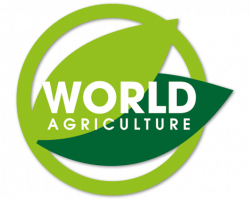Integrated farm management; reducing impact of agriculture and maintaining output – the example of LEAF in the UK
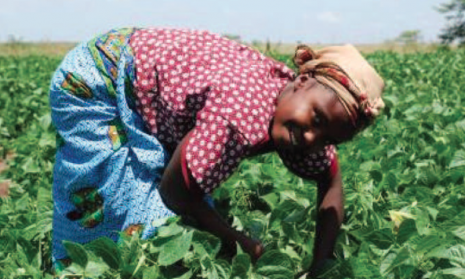
Summary
To address the challenges and choices for global sustainability, farming systems need to be supportive of traditional methods and encourage the development and adoption of new technologies.
There will need to be a range of farming systems that can be adapted to specific areas.
Furthermore, a collaborative approach is necessary, with farmers working together across landscapes and catchments. LEAF has worked with farmers in the UK, Europe and across the globe to encourage the development and promotion of Integrated Farm Management.
LEAF has delivered change in a proactive, engaging and empowering way by involving the whole food chain, including farmers, environmentalists, retailers and consumers.
Key words: Integrated Farm Management
Glossary
Stale seedbed: created by preparing a field for sowing or planting and then leaving for several weeks for weeds to germinate. The emerged weeds are killed before sowing or planting.
Abbreviations
CCRI; Countryside and Community Research Institute, University of Gloucester
Defra; Department for Environment Food and Rural Affairs
DFID; Department for International Development
EISA; European Initiative for the Sustainable Development in Agriculture
FOFP Focus on Farming Practice
Global GAP; Global Good Agricultural Practice
IFM; Integrated Farm Management
IFS Integrated Farming System
IOBC; International Organisation for Biological Control
LEAF; Linking Environment And Farming
LIFE; Low Input Farming System
RSPB; Royal Society for the Protection of Birds
Introduction
There is increasing pressure on the natural environment and resources of the world, so it is essential that farming systems are developed that have lower impact on the natural environment, but are also highly productive, to meet the needs of a growing population.
Land, water, biodiversity and natural habitats are under pressure from competing events.
By ensuring that political and consumer decisions incorporate the full value of environmental goods and services and by reducing the rate of loss of biodiversity husbandry contributes substantially towards achieving sustainable development, as described by the World Commission on Environment and Developments (Brundtland 1987).
The options for food production range from low intensity, low output, extensive farming to intensive highly productive systems.
While no single system will deliver the ultimate model, IFM strives to balance economic viability, environmental sensitivity and social gain to provide food security (FAO 1998).
IFM is built on the principles of Integrated Pest Management (IPM), a concept developed in the 1950s (IOBC 2011).
It has been developed as a workable framework for farmers to balance day to day challenges in a practical, realistic and achievable way, across their farm business.
In Europe, EISA is a network of organisations promoting and developing IFM, which includes LEAF in the UK.
LEAF was set up in 1991 to develop and promote IFM and to encourage a better public understanding of, and engagement in, farming and the countryside.
Since then, LEAF has been developing a whole farm approach to IFM through a range of methods, including technical management, demonstration farms, developing market opportunity and political influence.
This article describes how LEAF operates to deliver improvements to the farmed environment and in food.
What is Integrated Farm Management (IFM)?
IFM is a whole farm approach that combines the best of traditional methods with beneficial modern technologies, to achieve high productivity with a low environmental impact. (LEAF 2008).
The temptation, in problem solving of farming, is to pursue singly issues such as pollution, water security, carbon footprint, local production, and pesticides.
Individual approaches, however, do not resolve the interactions. An integrated approach has the potential to be forward looking and provide effective solutions for more sustainable farming,yet be flexible enough to meet changing priorities and address immediate consumer and political demands.
IFM (Fig. 1) provides a framework within which farmers can adopt solutions that yield more efficient and profitable production and which is socially acceptable as well as environmentally responsible.
It integrates beneficial natural processes into modern best farming practices, using appropriate science and technology, with established techniques.
In this way, IFM can deliver a highly productive agriculture with a reduced environmental impact.
The LEAF approach combines economic, environmental, social and welfare issues with management practices across the whole farm in a balanced way.
The benefits of Integrated Farm Management
Research (IACPA, 1995) has shown maintenance of profit through the adoption of IFM, mainly owing to lower input costs (Figure 2) with eductions of 40% in crop protection products, 15% in fertiliser use and 10% in operating costs, resulting in a 2% (-20% to +15%) increase in gross margin above conventional production (Figure 3).
The wide variation is due to the broad diversity of soil types and topography. The results showed that profitability increases in the IFM system as grain prices fall (Figure 4).
Subsequent to this analysis there have been significant price rises for fertilizer and fuel and increasingly volatile grain prices (Zaman 2010). Despite this, IFM has delivered increased profitability, environmental benefits and social capital (Mills 2010).
This study provides evidence from LEAF demonstration farms and members that the IFM approach provides reduced inputs and increased profitability (Table 1).
Further work at a LEAF Innovation Centre (Table 2) demonstrated the logic of IFM in delivering key sustainability benefits through the adoption of minimum tillage (Drummond 2005).
These approaches are consistent with environmental responsibility to farming to reduce impact on the local environment by:
*Optimizing /minimizing inputs I Encouraging an increase in biodiversity
* Reducing potential pollution
* Adherence to waste and energy management standards
* Improved soil management and maintenance of soil organic matter (See Box 1)
Links between biodiversity and agriculture
As increasing pressure is placed on food security, there are growing fears of environmental degradation.
The importance of the environment, biodiversity and the amenity benefit provided by our agricultural systems is frequently ignored.
People rely on biodiversity in their daily lives, often without realising it, so that it is undervalued.
The bacteria and microbes that transform waste into useful products, insects that pollinate crops and flowers, and the biologically rich landscapes that provide enjoyment, are only a few.
It has been concluded that IFM is better for biodiversity than conventional farming in mixed or arable systems (Berry et al. 2005).
However, a major challenge to widescale implementation of these approaches is the lack of appropriate policy frameworks and governance that align rural and agricultural policies with the protection of biodiversity and ecosystem services.
Without such links, the concern is that the value of integrated natural resource management systems and eco-agriculture innovations will remain marginal in ensuring the long-term viability of biodiversity.
Agriculture has two global trends that threaten biodiversity: intensification and abandonment.
The most intensive farm systems result in highly productive monocultures, with low biodiversity.
At the other end of the scale are the species rich, traditional farming systems that have shaped the European landscape and created habitats rich in species, yet are not sufficiently productive to meet global food security needs.
Through its effects on biodiversity, IFM offers the potential to gain benefits from these extremes.
Making Integrated Farm Management happen
LEAF was set up to emphasize the need for practical and achievable methods to farmers, consumers, processors and retailers, through management, demonstration and food assurance.
The role and potential of IFM in provision of more sustainable food security has been consolidated by cooperation between growers, environmentalists, consumers and companies throughout the agriculture and food supply chain.
This encourages implementation of sustainable measures through demonstration, communication and farm assurance (IACPA 1995).
The emphasis has been on grower involvement by creating added value for collaborating farmers through accrediting produce with environmental benefits.
Attention to detail is an essential part of IFM. Wise and efficient use of resources, smarter approaches to business planning and new technologies all contribute to increasing productivity, whilst still protecting valuable resources. IFM becomes a key to achieving long term food security.
In order to deliver IFM, LEAF focuses on four areas:
* Technical know-how by developing and promoting sustainable farming systems
* Demonstration and communication to create a better understanding amongst farmers and consumers
* Market opportunity by making accredited food chains easily accessible and affordable.
* Political influence by talking with policy makers
* Supporting research, innovation, education, knowledge exchange and communication throughout the food chain.
LEAF provides existing knowledge and sound husbandry updated by application of the results of research and technology. We actively encourage farmers to review their current practices and improve their production systems.
The aim is to provide management tools for farmers in the adoption of IFM.
The LEAF audit
The LEAF Audit was developed in 1993 with the collaboration of farmers, researchers, environmentalists, the food supply chain and agricultural industries.
It is a self-assessment whole farm management system that gives farmers the opportunity to appraise honestly, and improve their farming practices.
It enables farmers to set themselves targets for action annually and to compare themselves with other LEAF members.
It is based on the Environmental Management Systems approach operating in many other industries (Drummond 2000). Each year >1000 farmers complete the LEAF Audit, helping them adopt IFM.
It has provided the template for other farm assurance standards, including the Red Tractor (Drummond 2000) which has been developed as a food safety standard in the UK.
The Audit is updated annually and is well regarded throughout the agricultural industry, by, farmers, retailers, Defra and its agencies and environmental organisations, such as RSPB (fwi 2011).
The Green Box
The LEAF Green Box is a scheme, to help farmers assess and monitor the farm environment.
It was developed recently by LEAF in association with leading environmental organisations, researchers and members.
The Green Box supports farmers in monitoring the wildlife and resource management activities of their farm by providing knowledge and recording sheets.
It gives opportunity for farmers to gain a closer involvement with their local communities, encouraging partnerships and exploiting local skills, to help with monitoring.
Using this participatory approach provides a valuable way to develop the scheme, identifying beneficial practices that enhance biodiversity.
Demonstration Farms
Among the 2300 farmer members LEAF now has over 100 demonstration farms.
These promote IFM, helping other farmers to improve their business and environmental performance.
By using working farms, farmers and advisers are able to see what might be adapted to their own systems.
Demonstration Farms aim to provide reassurance and act as a source of inspiration for new ideas and technologies, receiving ca 20 000 visitors annually, including farmer groups.
They are not open farms and the arranged visits provide an important venue for considering issues of crop health, animal welfare, and environmental performance.
In 2000, we set up the LEAF Innovation Centres to work with research establishments, agricultural colleges and universities.
Our aim is to build knowledge, based on research for innovative solutions (LEAF 2009), to provide farmers with an insight to new ideas, some of which are yet to be used in practice.
This is critical in addressing sustainable farming options in the LEAF Sustainable Innovation Network which brings together farmers, industry and researchers.
Open Farm Sunday; Engaging consumers
Research has shown that when children, especially under the age of 11, experience a touch of wildness and learn basic outdoor skills their self- confidence is increased, encouraging freethinking and environmental awareness. (Louv 2005).
This awareness can lead to relevant shopping choices (CGU 2010).
If children gain these memories before the age of 11 the memories are retained for life. That is why Open Farm Sunday is so important to provide children and families a taster of country life.
Now in its fifth year, Open Farm Sunday encourages farmers to welcome the public on to their farms.
During this time, over 750 000 people have visited over 900 open farms coordinated by LEAF to make farming come alive.
LEAF provides resources and workshops for farmers dealing with health and safety. In June 2010 over 420 farmers took part and with the help of some 6 100 people in the industry, welcomed circa 184 000 consumers on to farms on one day.
Of these visitors 36% were under 18 (Figure 5).
Feedback shows that Open Farm Sunday plays an important part in explaining to the general public the important links between food, farming and the environment and over 80% of the visitors agreed that the day was valuable (Figure 6).
After visiting a farm, there was a clear shift in the public understanding of these issues from ‘poor’ or ‘good’ to ‘very good’ or ‘excellent’ (LEAF Open Farm Sunday 2010).
Market Standards
LEAF Marque was developed to provide a quality standard for food produced to IFM standards. It has built on farm assurance schemes, such as Assured Food Standards (http://www.redtractor.org.uk) and Global GAP (http://www.globalgap.org).
LEAF Marque is inspected jointly, or independently, with the existing schemes by the certification bodies involved with farm assurance.
The standard is developed collaboratively with many organizations, including Waitrose and other retailers, RSPB, Natural England, farmers, The Environment Agency and WWF.
It is managed by a technical advisory board and a management committee and provides a whole farm standard which requires that member producers demonstrate continual improvement in environmental management. (LEAF 2011).
LEAF Marque is an accredited scheme to the UKAS EN450011 standard to ensure that consistent inspections and certifications are carried out by multiple certification bodies worldwide.
This independence is vital. The owner or manager of a farm will contact the certification organization for inspection without any guarantee of a favourable outcome.
Ensuring the consistency of LEAF Marque worldwide is paramount. The food chain and consumers can verify product status using the associated LEAF Track’s system.
This is a custody and warranty agreement which tracks LEAF Marque produce, composite ingredients and products, giving LEAF the ability to carry out product audits.
This system facilitates trade in LEAF Marque produce within the food chain.
LEAF Marque is one of the fastest growing food standards. All the non- organic British fruit and vegetables sold by Waitrose are grown on certified farms.
Overall 18% of the UK’s fruit and vegetables are LEAF Marque accredited. However, only about 47% of the products from certified LEAF Marque farms bear the logo in retail stores, owing to mixture along the chain.
This is a lost opportunity we wish to change.
The IFM and LEAF Marque approach is now being used by farmers of 17 other countries in Europe, Middle East, South America and North Africa.
There are three pilot groups in Kenya, where 150 farmer members, some with as little as one-eighth of an acre, are being trained so that they can be certified as farming to LEAF Marque standard (LEAF Annual Review 2008 and 2009).
Trade policy is the driving force for this standard. Recognising the economic and social significance of export horticulture in Africa, in 2010 the DFID challenged (http://www.dfid.gov.uk/Working- with-DFID/Funding- opportunities/Business/FRICF/) major UK retailers to increase the flow of African produce to Europe, especially from smaller scale producers.
It offered to match funds pledged by retailers to invest in efforts for more African produce on shop shelves through grants from the Food Retail Industry Challenge Fund (FRICH).
Waitrose aims to increase sales of African fresh produce in their 241 stores by 10% of, for example, green beans and peas from Kenya and prepared fruit from Ghana, from small scale LEAF Marque accredited farms.
Long term sustainability is attractive, but reducing costs of production is another incentive.
Blueskies Ghana Limited gained LEAF Marque certification for 40 farmer suppliers in early 2009, who export prepared tropical fruits to five European countries and process 15 t of pineapples a day at their factory just north of Accra.
The passion of the African farmers is shared by many UK farmers. IFM and the LEAF Marque enable farmers to continually challenge their processes.
Assurance schemes have been developed in response to the significant challenges facing government, farmers and retailers to feed a growing world population and to help protect precious resources and the environment.
A recent study commissioned by Defra reveals that not all schemes are based on the same criteria (Lewis 2010).
LEAF Marque is leading the way in the environmental labelling of food. The research evaluated a number of schemes and compared how they help to protect the environment.
LEAF Marque scored the highest marks across a range of criteria, whereas better known schemes scored significantly less well in some important areas.
The report calls for a more consistent approach and highlights the need for environmental labelling to be based on robust, scientific evidence.
Online Encyclopaedia
Our knowledge base is developing into an online LEAFipedia to host technical information, practical solutions, and industrial examples.
We are also developing podcasts and videos as part of the reference system.
Conclusions
LEAF is developing the IFM model to promote the production of high quality, fairly produced food to enthuse farmers, consumers and retailers.
We work with farmers who are passionate about the food they produce and who care for their farm environment and natural resources.
Our members are also committed to taking their story into the market place with the of LEAF Marque to demonstrate that the producer has gone ‘the extra mile’ for the environment to provide good quality, affordable food, showing what they do, with events such as Open Farm Sunday.
LEAF works with thousands of farmers in the UK and overseas.
As the food chain becomes increasingly complex, we need to help consumers understand the story behind food, the authenticity of production standards, the commitment of the producers and how consumer buying decisions make a difference to how food is grown.
There will be stark choices for us to take as individuals and society, with new technologies, engineering innovations and preservation techniques.
These will allow us to grow more produce safely and with less impact on the environment.
Our strategy of communication and collaboration is fundamental to ensure a co-ordinated and comprehensive approach to sustainable agriculture.
Developing more sustainable systems of agriculture will continue to be a priority and LEAF and the adoption of IFM is a key part of making this happen.
References
Beddington J (2009) Sustainable Development UK 09 Conference 19 March 2009. www.sd- commission.org.uk/
Berry, P Ogilvy, S and Garnder, S (2005). Integrated farming and biodi- versity. ADAS/English Nature. English. Nature Research Reports no. 634.
Bruntland, G (1987). Our common future: The World Commission on Environment and Development. Oxford, Oxford University Press
CGU (2010) Unheard Voices: the case for supporting marginal farmers John Madeley
Drummond, C (2000). Environmental management systems in practice: the experiences of LEAF (Linking Environment And Farming) in meeting the needs of farmers, consumers and environmentalists. Aspects of Applied Biology 2000 No. 62pp 165 – 172.
Drummond, C (2005) LEAF Where is the payback IAgM Conference proceedings. Journal of Farm Management, 12 (5) EISA (2009). Integrated Farming Framework. A European Definition and Characterisation of Integrated Farming as Guideline for Sustainable Development of Agriculture in Theory and Practice. EISA. Rue J. B. Vandercammen 10, B-1160 Brussels
FAO (1998). The State of Food and Farming. Economic and Social Development Department, FAO, Rome
Foresight Report (2010). The Future of Food and Farming 25th January 2010. Government Office for Science Fwi (2011). http://www.fwi.co.uk/Articles/2010/12 /23/124900/New-Year-Plans-What-a- LEAF-audit-can-do-for-you.htm
IACPA (Integrated Arable Crop Production Alliance) (1995). Integrated Farming: Agricultural Research into Practice. MAFF.
IGD (2005). Connecting Consumers with Farming and Farm Produce, com- missioned by The Sustainable Farming and Food Strategy Implementation Group.
IOBC (2011). <http://www.uibk.ac.at/bipesco/iobc_w prs_2011/>
LEAF (2009). LEAF Sustainable Innovation Network Feasibility Study Knowledge systems – past reflection, future direction. LEAF, Stoneleigh Park, Warwick CV8 2 LG
LEAF Annual Review (2008 and 2009). LEAF, Stoneleigh Park, Warwick CV8 2 LG
LEAF Audit (2009). LEAF, Stoneleigh Park, Warwick CV8 2 LG
LEAF (2005a). Measuring Change Environmental Improvement on Farm over 10 Years, Demonstrated by Analysis of the I LEAF Audit Data. LEAF for the Crop Protection Association.
LEAF (2005b). Speak out CD Rom. LEAF, Stoneleigh Park, Warwick CV8 2 LG
LEAF (2011). <http://www.leafuk.org/LEAFmarquecer tification/standard.eb>
LEAF Open Farm Sunday (2010). Successes Shared. LEAF, Stoneleigh Park, Warwick CV8 2 LG
Lewis, K, Green, A., Tzilivakis, J. and Warner, D.J. (2010). The contribution of UK farm assurance schemes towards desirable environmental policy out- comes. International Journal of Agricultural Sustainability, 8(4): 237–249. I Louv, R (2005). Last Child in the Woods – saving our children from nature-deficiency disorder. Atlantic Books
Mills, J, Lewis, N and Dwyer, J (2010). The Benefits of LEAF Membership: a qualitative study to understand the added value that LEAF brings to its farmer members. CCRI Report to LEAF. LEAF, Stoneleigh Park, Warwick CV8 2 LG
Zaman H, (2010). Food Price Watch World Bank Poverty reduction and equi- ty group, Poverty reduction and eco- nomic management network. http://siteresources.worldbank.org/INT- POVERTY/Resources/NutritionalImpact_F oodPriceShocks.pdf
Download pdf
Figures
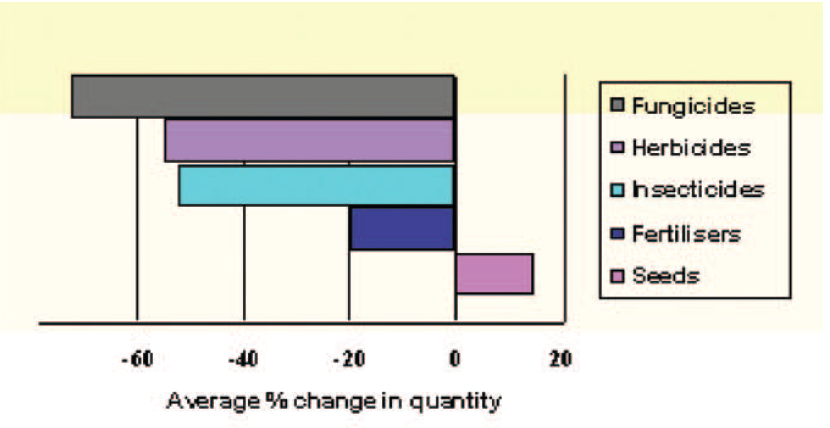
Figure 2: Average change (%) in quantity and use as a comparison of inputs in IFM and conventional production systems for arable farming (IACPA 1995)
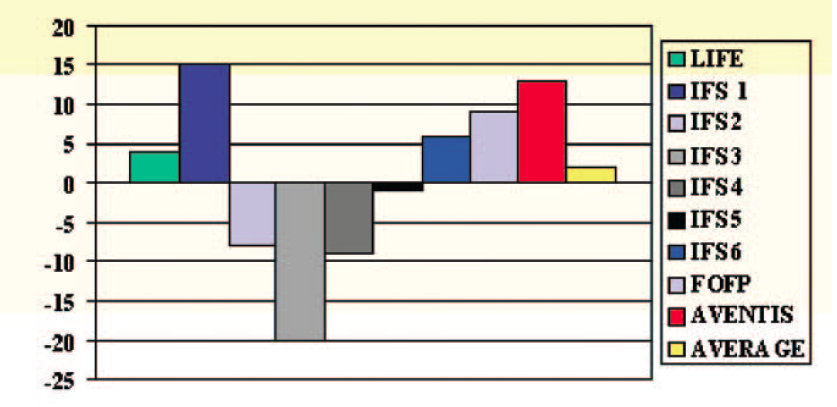
Figure 3: Change in Gross Margin (%). Comparison of margins in farming systems. IFS refers to the farming system, 1-6 and LIFE refers to Low Input Farming System (IACPA 1995)
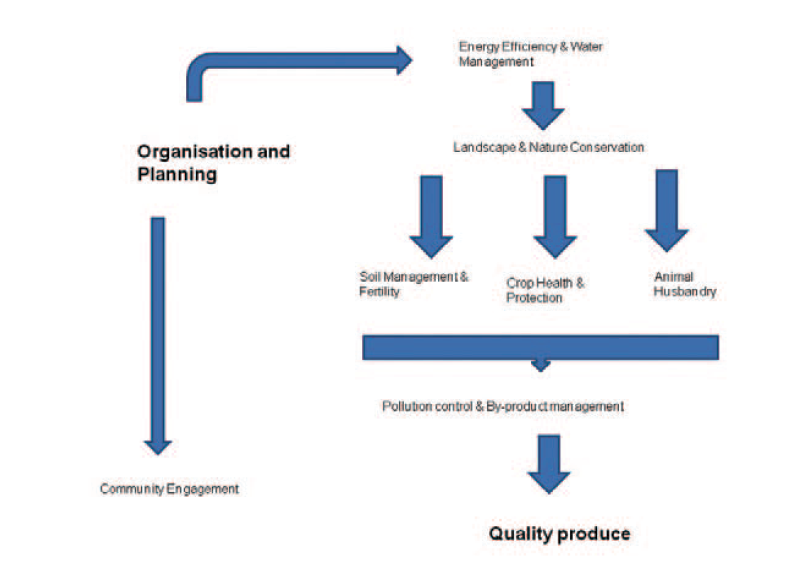
Figure 1: Integrated processes for IFM as prescribed by LEAF. Doing the right thing, the right way, for the right reasons.
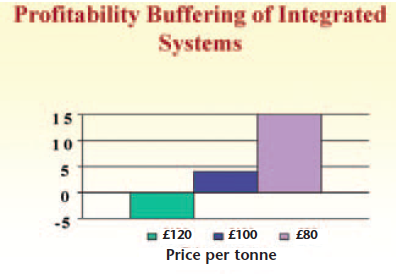
Figure 4: Impact of change in grain price in integrated farming systems compared with conventional systems (% change compared with conventional 100%) (IACPA 1995)
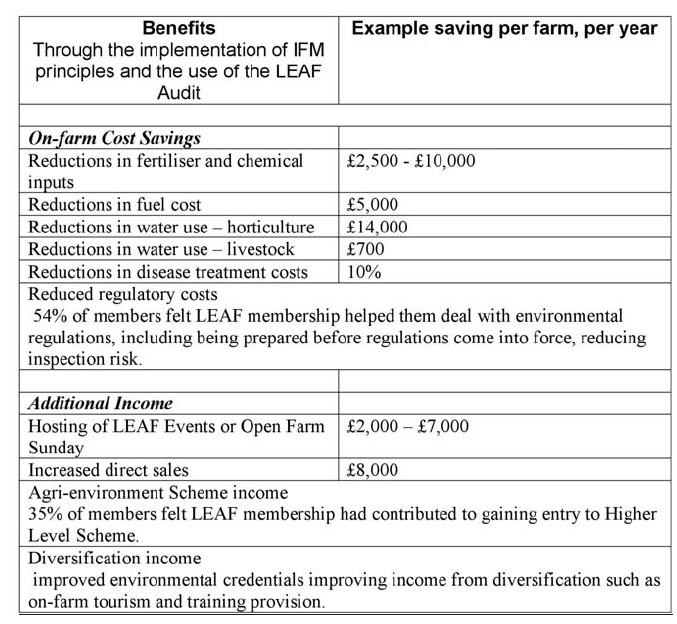
Table 1: Potential economic benefits of IFM, based on studies of typical farms
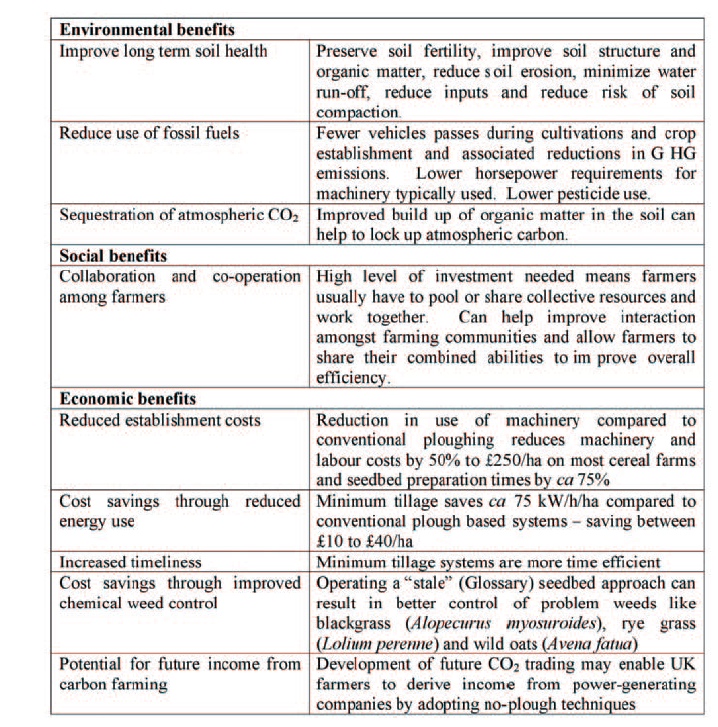
Table 2: Environmental, economic and social benefits of IFM and the rationale for reduced impacts.
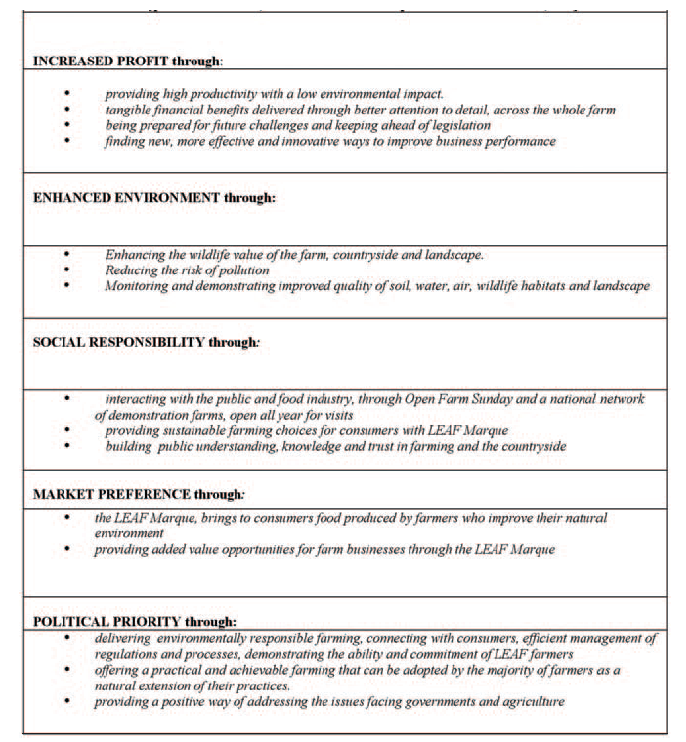
Box 1
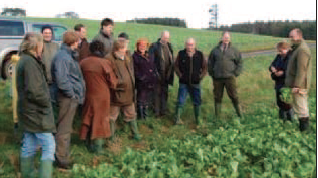
Plate 1: Visitors to a LEAF Demonstration Farm discussing soil management.
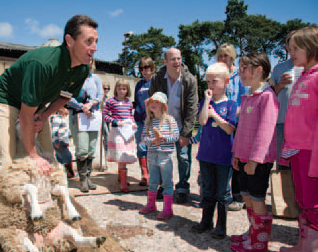
Plate 2: Demonstrations at Open Farm Sunday provide an opportunity to build trust and understanding among thousands of visitors.
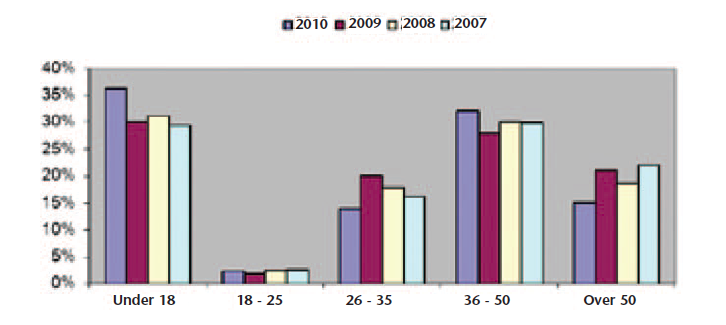
Figure 5: Age (years) distribution of numbers of farm visitors to Open Farm Sunday between the years 2007 to 2010
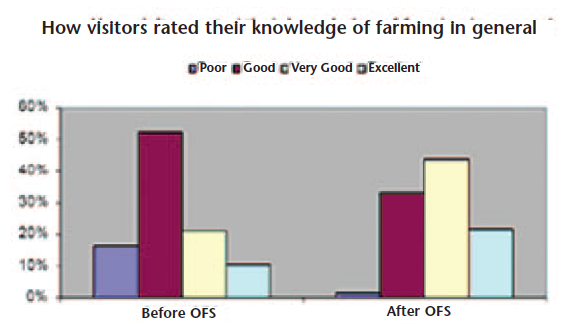
Figure 6: Change in distribution of knowledge of farming, poor to excellent (%) as estimated by all visitors before and after a visit to Open Farm Sunday in 2010
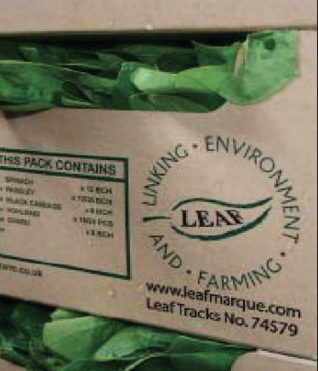
Plate 3: Packed spinach showing the LEAF marque logo and the LEAF Tracks reference to enable consumers and retailers to trace the product origin
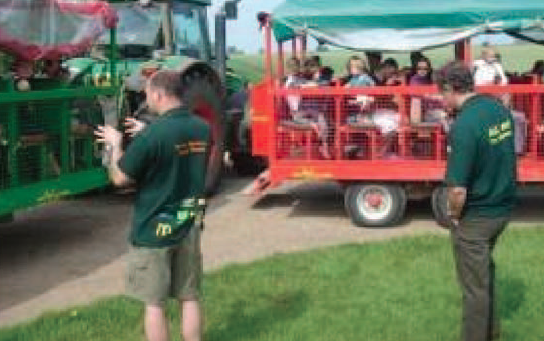
Open Farm Sunday

